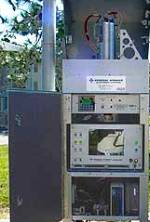
Monitors Confirm No Radiation Levels of Concern Have Reached U.S.
A national radiation lab is analyzing a sampling filter containing minuscule levels of an isotope from Hawaii consistent with the Japanese nuclear incident but still below levels of concern, EPA said.
During a detailed analysis of four West Coast RadNet air monitor filters, the U.S. Environmental Protection Agency identified trace amounts of radioactive iodine, cesium, and tellurium consistent with the Japanese nuclear incident. These levels are consistent with the levels found by a Department of Energy monitor last week and are to be expected in the coming days.
For daily updates, visit www.epa.gov/japan2011/data-updates.html
Preliminary monitor results in Hawaii detected minuscule levels of an isotope that is consistent with the Japanese nuclear incident. This detection varies from background and historical data in Hawaii. This isotope was detected at a fixed monitor in Hawaii, and it is far below any level of concern for human health. The sampling filter from this monitor is being sent to our national radiation lab for further analysis.
Samples also were captured by three monitors in California and one in Washington on March 18 and sent to EPA scientists for detailed laboratory analysis. The data was reviewed over the weekend and the analysis was completed Monday night. The radiation levels detected on the filters from California and Washington monitors are hundreds of thousands to millions of times below levels of concern.
In a typical day, Americans receive doses of radiation from natural sources like rocks, bricks, and the sun that are about 100,000 times higher than what has been detected coming from Japan. For example, the levels are 100,000 times lower than what a person is exposed to taking a roundtrip international flight.
EPA is in the process of conducting detailed filter analyses for fixed monitors located in Oregon.
EPA’s RadNet filter results for San Francisco, Seattle, and Riverside and Anaheim, Calif., detected minuscule quantities of iodine isotopes and other radioactive particles that pose no health concern at the detected levels. Below are the results of the detailed filter analysis. All of the radiation levels detected during the detailed filter analysis are hundreds of thousands to millions of times below levels of concern. All units are in Picocuries per meter cubed.
Filter results for Anaheim, Calif., found:
Cesium-137: 0.0017
Tellurium-132: 0.012
Iodine-132: 0.0095
Iodine-131: 0.046
Filter results for Riverside, Calif., found:
Cesium-137: 0.00024
Tellurium-132: 0.0014
Iodine-132: 0.0015
Iodine-131: 0.011
Filter results for Seattle, Wash., found:
Cesium-137: 0.00045
Tellurium-132: 0.0034
Iodine-132: 0.0029
Iodine-131: 0.013
Filter results for San Francisco, Calif., found:
Cesium-137: 0.0013
Tellurium-132: 0.0075
Iodine-132: 0.0066
Iodine-131: 0.068
EPA’s RadNet system is designed to protect the public by notifying scientists, in near real time, of elevated levels of radiation so they can determine whether protective action is required. In addition, an analysis of the filters in the monitors can identify even the smallest trace amounts of specific radioactive isotopes.
Source: EPA